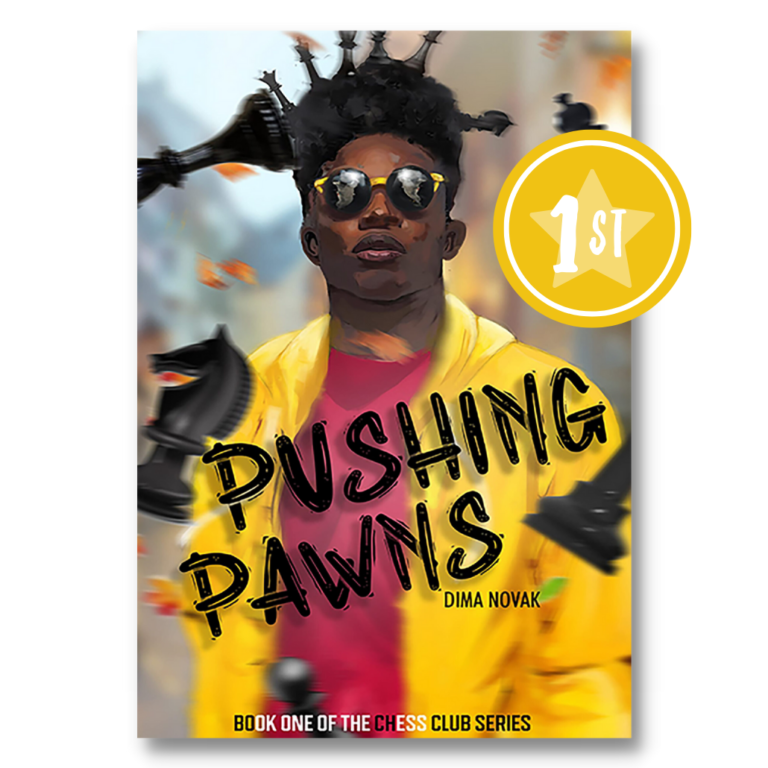
Pushing Pawns was the FIRST PLACE fiction winner of the 2022 IndieReader Discovery Awards, where undiscovered talent meets people with the power to make a difference.
As we already posted an All About the Book interview with author Dima Novak, following find an essay written by the author with further info about his winning book.
***
Why chess? Why now? What probably springs to mind is the smash success of a certain cable television series, which made the ancient game suddenly glamorous, even sexy.
In fact, however, the primary inspiration for Pushing Pawns was my son’s experiences as a brown kid growing up New York City. Chess, I thought, would be a useful framework for telling a larger story about the dilemmas and dreams of contemporary urban teenagers.
I’d been playing with the idea of creating a YA novel about chess for several years, ever since my son was involved in New York’s justly famous Chess in the Schools program. At the time he would have adored reading some kid-appropriate fiction about the game, but we couldn’t find any. (The closest thing was Walter Tevis’s The Queen’s Gambit, but I figured that story was too grim for young readers. Shows how wrong you can be.)
Taking my kid to tournaments was a learning experience. It opened a window into the world of today’s city kids, wrestling with change, choices and challenges. The matches were hard fought and electric, the young players remarkably diverse in class and race. For them, chess offered a rare level playing field. Kids from disadvantaged backgrounds or tough neighborhoods could take on the city’s most privileged youngsters. Girls could beat up on the boys. Once the clock was punched, nothing mattered except expertise, intelligence, and the will to win.
That’s why my protagonist, 14-year-old Moses Middleton, sees chess as a way to rise. A secretly sensitive kid with high hopes, he wants to transcend the meager choices typically available to brown and black adolescents. Through chess, he aims to build solidarity with his teammates, a wildly diverse crew of very bright kids who defy the usual stereotypes. They’re ambitious, talented, uncompromising. They speak in a playful lingo that mixes street slang with popcult references and the high-flown vocab they’ve absorbed in preparation for the SATs.
The makeup of the chess team reflects the unique character of the community in which the story takes place — Jackson Heights, Queens, reputedly the most diverse neighborhood in the world. It’s been my home for more than 20 years, and I’ve tried to do justice to its culture, vitality and geography. (Not to mention its food, which is incomparable.) It’s now undergoing a rapid, sometimes ruthless, process of gentrification, which puts a variety of pressures on the kids who live there.
So there’s a political slant, too, and it’s edgy. Race and class figure prominently; unjust authority figures are challenged and exposed. (I should disclose that one of the characters is harassed by a sexual predator; nothing’s explicit and things turn out okay, but let this serve as a trigger warning.) There’s also a deliberately provocative take on the Soviet style of chess, as embodied by an aging Russian grandmaster who becomes the team’s Mr. Miyagi.
It’s a lot to pack into a coming-of-age story. But I hope that what emerges is a truthful picture of 20th Century adolescence. Nothing’s simple or stable; friends become enemies and vice-versa; ideas and experiences come flying at you with unmanageable speed; young lives are impacted arbitrarily by earthshaking events. In a storm-tossed world, the game of chess can be an anchor. To quote my protagonist:
“I was about to get rabbit-holed by the vastness and complexity of the universe, like when you stare at the stars too long, so I tried to chill by running through some chess positions in my head. Chess was reassuring, somehow: You always start with the same 64 squares, the same pieces and pawns, the same clear set of rules that everyone agrees on and understands the same way. At the outset, it’s perfectly ordered and beautiful, a moment of pure potential frozen in time. It’s only after you make a move that things turn to shit.”
Or, he might have added, to gold.
